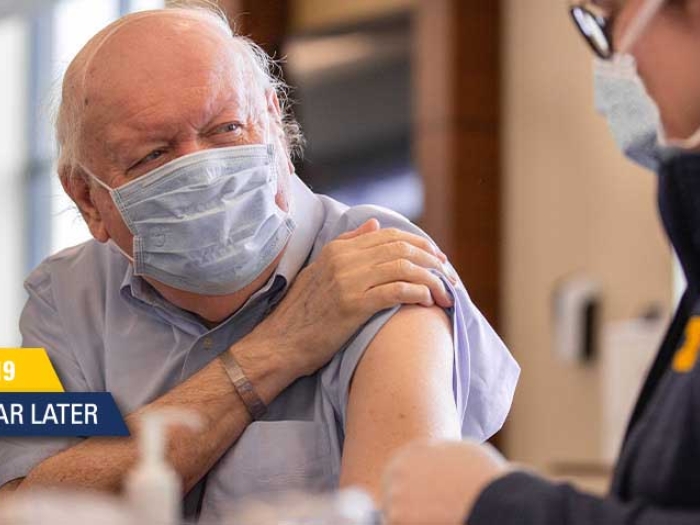New national and state guidance doesn’t apply to all places or people.
2:51 PM
Author |

The announcement that fully vaccinated people can now go without a mask in more places – indoors and outdoors – might sound like music to your ears.
Or maybe you think it's too much, too soon.
Or maybe you were done with masks a while ago and think it's about time everyone else was too.
No matter where you fall on the mask spectrum, here are 11 things to know right now:
1. The reason behind the new rule is that the vaccine works.
If you're fully vaccinated, the science now shows you are highly protected against getting sick or spreading the coronavirus to others. The vaccine is extremely effective at preventing COVID-19 infections as well as COVID related hospitalizations and severe disease.
In fact, of the more than 2,000 COVID hospital admissions at Michigan Medicine since March, less than 1% of the patients had been fully vaccinated.
So if it's been at least two weeks since your second dose of a two-dose COVID vaccine, or your only dose of a single-dose vaccine, you truly can interact with people safely without a mask in many situations, indoors and out.
2. Not vaccinated or not done with your shots yet? Keep that mask on indoors and in crowded outdoor settings.
If you haven't gotten vaccinated yet, or you're not planning to, or you have a child who isn't old enough to get vaccinated yet, the new rule doesn't apply to you or them. The same goes if you or your teenager are not yet two weeks out from your last or only dose of vaccine.
You or your unvaccinated child still need to wear a mask indoors in most situations, except your own home and small gatherings with vaccinated people, and in settings where your state or city allow such as indoor dining.
Why? You can still spread the virus to other unvaccinated people, and vulnerable vaccinated people too. You're on the honor system, and if you don't follow the rules, you can put others at serious risk.
SEE ALSO: Who Has a Right to Ask if You're Vaccinated?
3. The vaccine may protect some people less – so they should keep wearing masks indoors and near others outdoors.
Someone whose immune system is compromised because of a condition they have or a treatment they're getting – such as chemotherapy or an organ transplant – might not have the ability to fight off a coronavirus infection as well, even if they've been fully vaccinated. They need to talk with their doctors and continue to mask up and be cautious in settings where unvaccinated people are present.
4. The new rules about indoor masking don't apply to all places.
On a national level, masks are still required for all people – vaccinated or not – in all health care facilities, transportation settings such as airports and airplanes, trains and buses, correctional facilities and homeless shelters.
MORE FROM MICHIGAN: Sign up for our weekly newsletter
Michigan Medicine continues to require that all employees, patients, visitors and vendors in all of its facilities wear masks indoors.
5. States, cities, businesses, school districts and institutions can still set their own mask requirements.
Just because an unvaccinated person can go without a mask indoors in one setting doesn't mean they can go without one in all indoor settings. States and cities can make stronger requirements than the federal guidance.
For instance, the state of Michigan currently says that masks are required in all indoor settings for unvaccinated and partially vaccinated people. But all Michiganders can go without masks in all uncrowded outdoor settings.
Similarly, a business owner has the right to continue to require all people – workers and customers – be masked inside their store, office or facility. Or they can ask for proof of vaccination in order to allow some people to enter, receive services or go maskless.
A school district or university can also require masking indoors, though many have relaxed the mask rules for everyone who is outdoors on their property, in keeping with the national guidance issued earlier this month. The same goes for museums, theme parks, concert venues and theaters and more.
6. Even if you're fully vaccinated, but you want to keep wearing a mask, feel free – and don't let anyone bully you out of it.
You might be perfectly healthy and protected by the vaccine, but maybe the number of cases of COVID-19 in your area is still high – which is the case in much of Michigan right now, and other parts of the country too. "Breakthrough" cases of COVID-19 do happen in vaccinated people, though they're usually milder than they would have been if the person wasn't vaccinated.
The higher the rate of cases in your area, and the more exposure to unvaccinated people you have, the more it might make sense to continue wearing a mask indoors and in crowded outdoor settings, even if you're not required to.
You also have the right to wear a mask to set an example for your unvaccinated children, or to show empathy when you're with a vaccinated relative or friend who is immunocompromised. However, you truly don't need it when you're outdoors but not near other people, or when you're with other fully vaccinated and healthy people.
For some people, the psychological adjustment away from masks will take time – so it's also OK to take it slow.
SEE ALSO: So You Got Vaccinated Against COVID-19. Now What?
7. Keep a mask handy just in case.
Since you might find yourself in a situation where a mask is needed – such as a store that's requiring it, or an unexpected trip to a health care facility – you'll probably want to stash a mask in your purse, glove compartment, backpack or jacket pocket.
8. If you are having work done by others in your home, you can ask them to wear a mask or show that they've been vaccinated.
Especially if you are not fully vaccinated, immunocompromised or have children who aren't yet able to be vaccinated, you have the right to protect yourself. If the workers decline to say if they're vaccinated, they should wear a mask.
9. If you're traveling, check the mask requirements at your destination.
Even if there isn't a state or city mask rule, you may find that hotels or theme parks require or encourage masks in some areas. And again, even if you're fully vaccinated but still want to wear a mask and have your unvaccinated children do the same, that's your right.
Like Podcasts? Add the Michigan Medicine News Break on iTunes, Google Podcast or anywhere you listen to podcasts.
10 . Keep washing your masks or disposing of disposable ones correctly.
If you wear a cloth one, wash it and put it in the dryer or hang it to dry (preferably in sunlight) after being out in public in it for more than a few hours. If you use a disposable one, put it in a trash can after using it for a few hours or if it becomes wet or soiled.
11 . If you see someone wearing a mask in a place where one is optional, resist the urge to ask why.
They may have a medical condition they'd rather not disclose, or perhaps they're trying to set an example for their children or support the wishes of someone they're with. They may have chosen not to be vaccinated yet, but still want to protect themselves. Or perhaps they're fully vaccinated with no health problems, but they're just being cautious to avoid a 'breakthrough' infection, especially if they're a worker who has to be face-to-face with the public all day. No matter what their reason, wearing a mask still provides protection for them. It also helps protect unvaccinated or vulnerable people around them if the mask-wearer is infected and capable of spreading the virus.

Explore a variety of healthcare news & stories by visiting the Health Lab home page for more articles.

Department of Communication at Michigan Medicine
Want top health & research news weekly? Sign up for Health Lab’s newsletters today!





